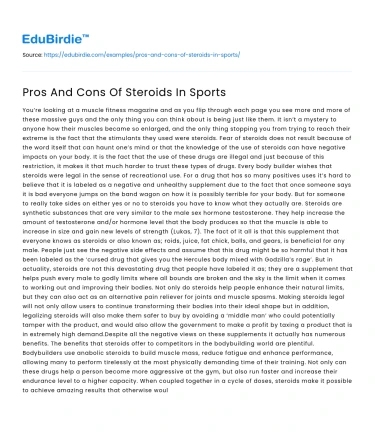Introduction
The use of steroids in sports has long been a contentious issue, provoking intense debate among athletes, sports organizations, and the public. Steroids, or anabolic-androgenic steroids (AAS), are synthetic derivatives of testosterone, primarily utilized to enhance muscle mass and performance. While some argue that steroids can bring about remarkable improvements in an athlete's capabilities, others contend that their use undermines the spirit of fair competition and poses significant health risks. The dichotomy between the potential benefits and the ethical concerns of steroid use in sports necessitates a thorough examination. This essay aims to explore the advantages and disadvantages of steroids in sports, highlighting real-life examples and expert opinions to present a balanced perspective. Understanding the multifaceted impact of steroids on sports requires delving into both the enhancement of athletic performance and the corresponding ethical and health implications.
Performance Enhancement and Competitive Edge
One of the primary reasons athletes turn to steroids is their ability to significantly enhance physical performance. Anabolic steroids facilitate an increase in muscle size and strength, which can be crucial in sports where power and endurance are critical. For example, in professional bodybuilding, the use of steroids has become almost synonymous with success. Arnold Schwarzenegger, a seven-time Mr. Olympia winner, once remarked, "The secret is in the pump," referring to the enhanced muscle growth that steroids can facilitate. Steroids also expedite recovery times, allowing athletes to train harder and more frequently, thereby gaining a competitive edge. This performance boost can be alluring in highly competitive environments where even a slight advantage can determine the outcome of events.
Save your time!
We can take care of your essay
- Proper editing and formatting
- Free revision, title page, and bibliography
- Flexible prices and money-back guarantee
However, the advantages of steroid use are not without significant drawbacks. The reliance on performance-enhancing drugs raises ethical concerns about fairness and integrity in sports. Critics argue that steroid use creates an uneven playing field, where success becomes less about talent and hard work and more about who has access to better performance-enhancing drugs. The World Anti-Doping Agency (WADA), which governs anti-doping policies globally, categorically bans steroids, highlighting their stance that such substances violate the principles of fair competition. Moreover, the pressure to use steroids can trickle down to younger athletes, fostering a culture where drug use is perceived as a necessary step to achieve athletic success. This ethical dilemma underscores the complexity of allowing performance-enhancing drugs in sports.
Health Risks and Ethical Considerations
The health risks associated with steroid use are profound and multifaceted, often overshadowing the potential performance benefits. Medical research has consistently shown that prolonged steroid use can lead to severe health complications, including cardiovascular diseases, liver damage, and hormonal imbalances. A study published in the Journal of Clinical Endocrinology & Metabolism found that steroid users are at a higher risk of developing heart-related illnesses compared to non-users. Additionally, psychological effects such as aggression, mood swings, and depression are well-documented side effects of steroid use, commonly referred to as "roid rage." These health concerns are not only detrimental to the individual athlete but also pose broader implications for public health and safety.
Despite these risks, some athletes and advocates argue for the regulated use of steroids under medical supervision, suggesting that such an approach could mitigate health risks while allowing athletes to benefit from their performance-enhancing properties. However, this perspective is met with strong opposition from health professionals and sports ethicists who maintain that the potential for misuse and abuse remains high. The case of Lance Armstrong, a former professional cyclist who admitted to using performance-enhancing drugs, exemplifies the complex interplay between health risks and ethical breaches. Armstrong's case not only highlights the health dangers associated with steroid use but also demonstrates the potential for significant reputational damage and the erosion of public trust in sports. These considerations underscore the need for stringent regulations and education on the risks of steroid use.
Conclusion
In conclusion, the use of steroids in sports presents a complex interplay of benefits and risks that demand careful consideration. While steroids can undoubtedly enhance athletic performance and provide a competitive edge, the ethical concerns and significant health risks associated with their use cannot be overlooked. Real-life examples and expert opinions illustrate that while some advocate for the regulated use of steroids, the potential for abuse and the undermining of fair competition present compelling arguments against their use. Sports organizations, athletes, and policymakers must work together to address these challenges, ensuring that the integrity of sports is upheld while safeguarding the health and well-being of athletes. As the debate continues, it remains crucial to foster an environment that prioritizes ethical standards and fair play in the world of sports.






 Stuck on your essay?
Stuck on your essay?

